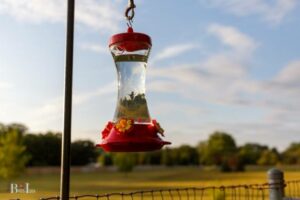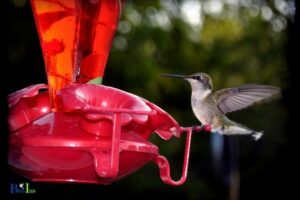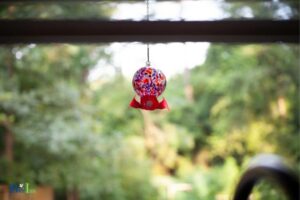What Scares Hummingbirds Away? Learn Why They’re Scared
Hummingbirds are scared away by loud noises, bright or flashing lights, or strong smells. These stimuli can cause hummingbirds to flee an area immediately.
Hummingbirds are petite and delicate, which makes them cautious by nature. Loud sounds and abrupt movements can startle them easily.
They are attracted to bright colors, especially red, but can get scared of certain bold colors like yellow. Cats and dogs, being their natural predators, can scare them away.
Furthermore, human activities, particularly those involving changes to their habitat, can make them uncomfortable.
Other aggressive bird species, if present nearby, can intimidate hummingbirds and drive them away.
Lastly, if they do not find sufficient food sources in an area, they will likely move on to search for better foraging grounds.
8 Factors That Scare Hummingbirds Away
| Factors | Explanation |
| Predators | Hummingbirds are scared of larger animals like cats, falcons, and owls that may prey on them |
| Loud Noises | Hummingbirds are easily startled by sudden, loud noises like construction sounds, loud music, etc. |
| Strong Scents | Hummingbirds have a keen sense of smell and are repelled by strong odors, such as those from pesticides, strong perfumes, or paints |
| Poor Quality Food | Hummingbirds can be deterred by food sources that have gone bad, like fermented nectar in feeders |
| Lack of Natural Habitat | A lack of trees, shrubs, or flowering plants, which provide nectar and shelter, can scare hummingbirds away |
| Unfavorable Weather | Ranging from extreme heat to freezing temperatures, such drastic changes in weather can affect hummingbirds and drive them away |
| Large Crowds | Constant human activity or large gatherings can make hummingbirds feel threatened and scare them away |
| Lack of Water | Hummingbirds need water for drinking and bathing. A lack of it can make an area less appealing |
Key Takeaway

Five Facts About: What Scares Hummingbirds Away
What Are The Common Causes of Hummingbird Fear?
Hummingbirds are generally not aggressive and are rarely a danger to humans or other animals, however, they can become fearful in certain situations.
Common causes of hummingbird fear include
- loud noises,
- predators,
- humans/other animals approaching too closely,
- unfamiliar surroundings, and being startled.

To reduce the hummingbird’s fear, it is important to create a safe, calm and quiet environment. Some practical tips include keeping cats and other predators away, speaking in a soft, low tone, and avoiding sudden movements.
Additionally, make sure to keep any artificial lights, loud music or other sources of noise at a safe distance away from the hummingbird.
What Natural Predators Scare Hummingbirds?

Hummingbirds are prey to a range of animals, including hawks, jays, crows, orioles, roadrunners, domestic cats, snakes, and larger insects.
Other predators such as weasels and domestic cats can also be a danger. Hummingbirds rely on their speed, quick reflexes, and the protection offered by foliage or shrubs to elude predators.
They are also known to mob predators as a defense mechanism. There are also a range of natural parasite threats to hummingbirds, like lice and mites.
The list of predators and natural threats to hummingbirds include:
- Hawks
- Jays
- Crows
- Orioles
- Roadrunners
- Domestic cats
- Snakes
- Larger insects
- Weasels
- Lice
- Mites
What Are Some Manmade Reasons for Hummingbird Fear?
Hummingbirds have an instinctive fear of people or other creatures, mostly due to their size in comparison to other birds.

Here are some manmade reasons for hummingbird fear:
Bright or rapid movements – Hummingbirds are easily startled by sudden and unexpected movements around them.
Loud noises – Loud noises, such as music or other noises, can frighten a hummingbird.
Invasive interaction from humans and pets – Hummingbirds are wary of human or pet interaction and can be startled if they feel threatened or invaded.
Unfamiliarity with their environment – Birds are not used to humans or other creatures nearby and may fly away if they feel threatened or scared.
Unfamiliar food or objects – Hummingbirds may be scared off if unfamiliar food or objects appear in their surroundings.
Unsafe perching locations – Hummingbirds may be scared off if they feel that a perching location is unsafe for them.
Bright lighting – Hummingbirds may be scared off if bright lighting is pointed towards their area.
Unknown predators – Hummingbirds may flee if they sense an unknown predator in their territory.
How Can You Keep Hummingbirds Away From Your Property?

Caring for a hummingbird requires providing the bird with sufficient food, clean water, and a safe place to rest. While hummingbirds can be charming, it is not possible to keep them as pets.
To deter hummingbirds from visiting your property, some possible strategies include:
- Avoiding the use of bright artificial lights and flowery ornamental plants.
- Hanging wind chimes, ribbons, or other deterrents such as aluminium foil strips.
- Hang brightly coloured objects to discourage the birds from approaching your property.
- Installing a hummingbird feeder far away from your home.
- Immediately addressing any sources of food, such as ripe fruits and flowers that may attract hummingbirds.
What Is The Best Way to Calm a Frightened Hummingbird?
Caring for a hummingbird requires patience and special attention. If a hummingbird is frightened, it is best to remain still and quiet and avoid sudden movements.
Following are the best ways to calm a frightened hummingbird:

- Move slowly: Any sudden movements or loud noises will only further scare the hummingbird. Move slowly and gradually to give the bird time to adjust to your presence.
- Speak in low and calm tones: Speaking softly can help the bird feel relaxed and safe.
- Dim the lights: Lowering the lights in a room or outside can also help the hummingbird feel less threatened.
- Offer food: As long as hummingbirds are comfortable in their surroundings and are not threatened, they will feed. Feeding them may help to calm them and make them realize that you do not intend to harm them.
- Spray mist: Having a spray bottle of water and misting the area can help the bird to calm down and not be as frightened.
- Water nearby: A water source can help the bird relax and provide a safe place to drink.
- Provide shelter: A place of shelter such as a tree or bush will help the hummingbird feel more secure and safe.
What Are The Benefits of Keeping Hummingbirds Away From Your Property?

Keeping hummingbirds away from your property can provide a variety of benefits. These include:
Reduced Risk of Injury: Hummingbirds have sharp beaks and can deliver painful pecks if they feel threatened. Keeping them away from your property reduces the chance of injury.
Reduced Insects: Hummingbirds feed on small insects, and can help reduce their numbers around your property.
Less Noise: Hummingbirds can be quite noisy when they migrate, especially when they roost in large groups. Keeping them away from your property can help reduce the disruption.
Reduced Damage to Plants: Hummingbirds can cause damage to garden plants as they feed. Keeping them away can help reduce this damage.
Reduced Risk of Diseases: Diseases can be spread when hummingbirds interact with other birds or directly by their droppings. Keeping them away from your property can help reduce the risk of diseases.
Reduced Dust and Dirt: Hummingbirds can stir up dust and dirt when they feed, which can be a nuisance. Keeping them away can help reduce this problem.
Reduced Competition for Food: Hummingbirds can compete with other birds and small animals for food, water, and nesting materials. Keeping them away can help reduce this competition.
Less Stress: Hummingbirds can be disruptive when nesting near a property, and may cause stress to people or other animals.
Do Different Species of Hummingbirds React Differently To Fear?

Yes, different species of hummingbirds do react differently to fear. Different species have distinct behaviors and reactions in response to that fear.
Generally, when threatened hummingbirds will fly away, hide, or even become aggressive. Some species become more active when they are afraid while others might freeze or take a defensive posture.
Common fear-related behaviors from hummingbirds include vocalization, skittishness, and defensive motions such as wing spreading.
It’s important to note that hummingbirds, like all animals, vary in their response to fear and that some individuals may not display any fear-related behaviors.
FAQ of What Scares Hummingbirds Away
What scares hummingbirds away?
How do I keep hummingbirds from leaving my garden?
What do hummingbirds eat?
Are hummingbirds territorial?
What sounds do hummingbirds make?
Conclusion:
Hummingbirds can easily be scared away by loud noises, bright or flashing lights, strong smells, or predators.
Keeping these stimuli away from their habitat is key to creating a safe and welcoming environment for them.






